|
|
|
|
The shock of the attack on the U.S. Capitol still lingers. On both mainstream and social media, people questioned how something like this could happen in a country that prided itself as being the world's greatest democracy. The surprise also lies in the inability (or unwillingness) of security forces to prevent the walls of the Capitol from being breached.
Today in The Conversation Canada, Jack Rozdilsky at York University questions why people were so surprised. And — more concerningly — why were those responsible for maintaining law and order in Washington surprised too, as evidenced by the absence of a more substantial security presence. Rozdilsky writes that protests at the Capitol have historically been met with more force than was shown this week, including the heavily armed military presence during the Black Lives Matter protests of last summer. "It may have been beyond authorities’ range of imagination that pro-Trump mobs would actually attack the Capitol," he writes. But they
did, and Rozdilsky cautions that the threat of possible future insurrections remains because of what this event has communicated.
It's just one of several stories on the Capitol attack. We also look at the influence of QAnon conspiracy theorists, explore the myth of American exceptionalism and whether Trump will face criminal charges once he leaves office. As well, we've included some fresh takes on the attack from our colleagues across the global network of The Conversation.
Come back later in the day to see more about this developing story.
Regards,
|
Nehal El-Hadi
Science + Technology Editor
|

|
|
Attack on the U.S. Capitol
|
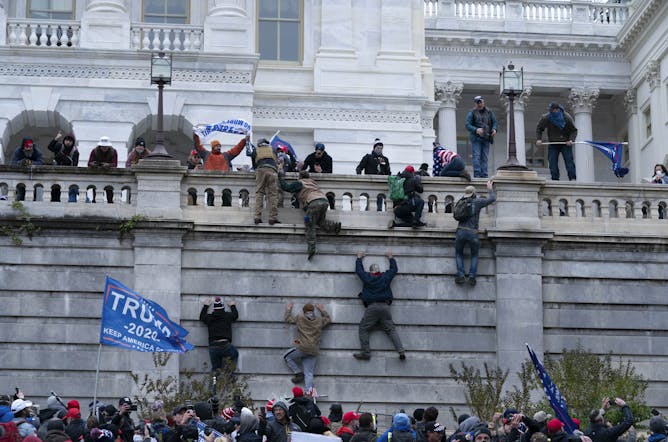
Supporters of President Donald Trump climb the west wall of the U.S. Capitol on Wednesday, Jan. 6, 2021, in Washington, D.C.
(AP Photo/Jose Luis Magana)
Jack L. Rozdilsky, York University, Canada
U.S. citizens and lawmakers failed to account for the threat to democracy that resulted in the storming of the Capitol. This reflects a denial of the series of events that led to this moment.
|
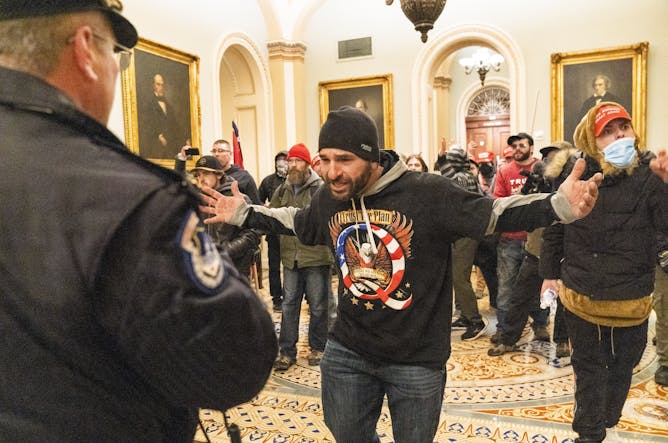
A supporter of President Donald Trump, seen wearing a QAnon shirt, is confronted by Capitol Police officers outside the Senate Chamber during the invasion of the U.S. Capitol.
(AP Photo/Manuel Balce Ceneta)
Marc-André Argentino, Concordia University
Conspiracy theories spread online are the backbone of Donald Trump's falsehoods about his loss in the U.S. election. The real world consequences of those conspiracies have now exploded.
|
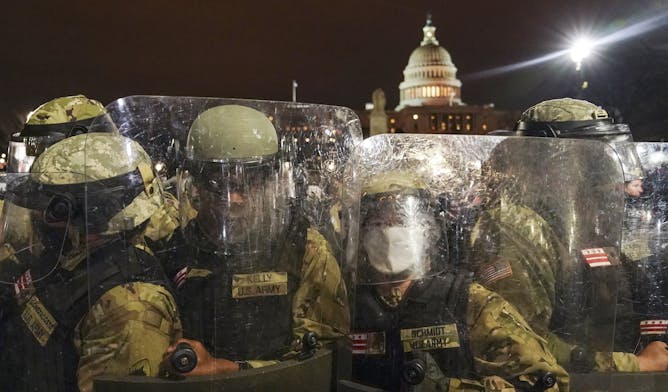
DC National Guard stand outside the Capitol on Jan. 6, 2021, after Trump supporters stormed the building in an attempt to overturn the U.S. presidential election.
(AP Photo/John Minchillo)
Ronald W. Pruessen, University of Toronto
Donald Trump's tenure as president reveals how pathologies are part of what Americans see as their "exceptionalism."
|
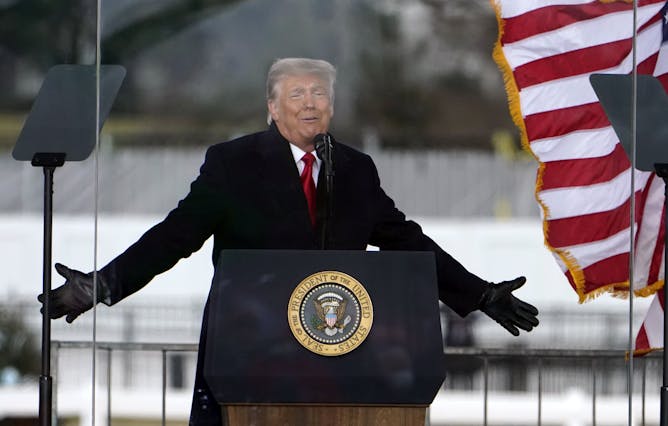
Donald Trump speaks to supporters hours before a violent attack on the U.S. Capitol.
(AP Photo/Jacquelyn Martin)
Thomas Klassen, York University, Canada
After blazing an unprecedented post-election path of inciting violence, Donald Trump's path forward contains some potential landmines.
|
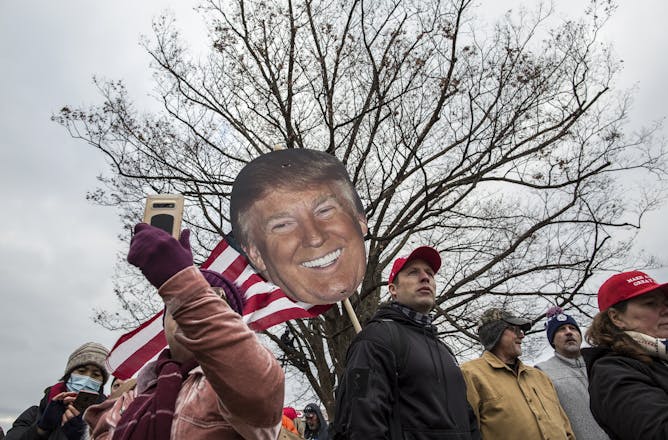
After President Trump incited violence on Jan. 6, some high-ranking officials say he is unfit to lead the United States.
Probal Rashid/LightRocket via Getty Images)
Stephanie Newbold, Rutgers University - Newark
Vice President Pence could invoke the 25th Amendment of the US Constitution, also known as the Disability Clause, if he believes Trump is 'unable to discharge the powers and duties of his office.'
|
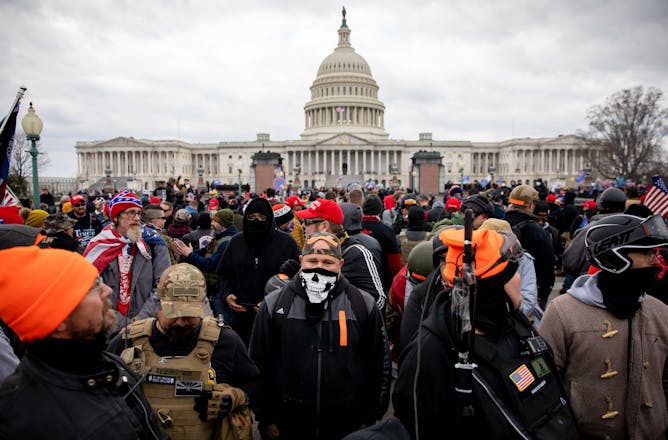
The Proud Boys outside the U.S. Capitol in Washington, D.C., on Wednesday, January 6, 2021.
(Amanda Andrade-Rhoades/For The Washington Post via Getty Images
Shannon M. Smith, College of Saint Benedict & Saint John's University
The protests that ended in the storming of the US Capitol included members of white supremacy groups, the latest example of such groups being encouraged by politicians to challenge government.
|
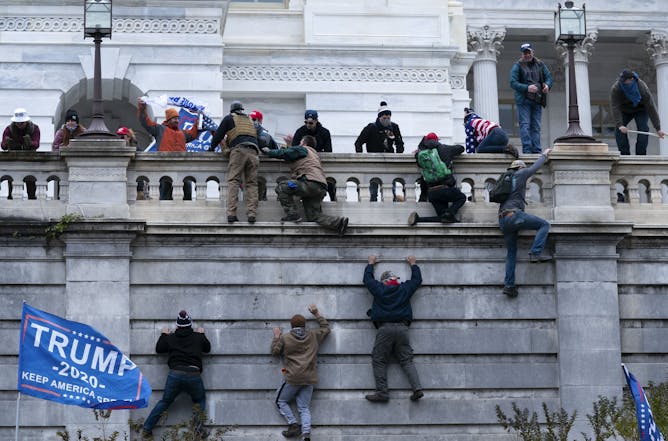
AP Photo/Jose Luis Magana
Jordan McSwiney, University of Sydney
Far-right Trump supporters are afraid American democracy has been overturned by their left-leaning 'opponents', even as they themselves actively undermine liberal democratic values and institutions.
|
Other top stories
|

Even though some people are being vaccinated for COVID-19 vaccines, most of us will need to deal with the stress of the pandemic for months to come.
Shutterstock
Igor Grossmann, University of Waterloo
Leading minds in behavioural and social sciences share perspectives on changes ahead and give advice how to make it through the pandemic.
|

The emoji has become a critical part of our online communications, particularly during the COVID-19 pandemic when face-to-face contact is hard to come by.
(Domingo Alvarez/Unsplash)
Ethan Pancer, Saint Mary’s University; Lindsay McShane, Carleton University
In the absence of face-to-face interactions, people are using emojis to help express themselves. New research suggests that emoji use can drive engagement and make content more viral.
|

People protest outside the Tendercare Living Centre long-term-care facility in Scarborough, Ont. on Dec. 29, 2020. This LTC home has been hit hard by the second wave of the COVID-19 pandemic.
(THE CANADIAN PRESS/Nathan Denette)
Don Drummond, Queen's University, Ontario; Duncan Sinclair, Queen's University, Ontario
Canadians are living longer, but are they living well? The challenges to aging well go beyond the problems in long-term care. Substantial change to Canada's support service systems is long overdue.
|
| |
| |
| |
| |
| |
| |
|
|
|
|
|
|
|